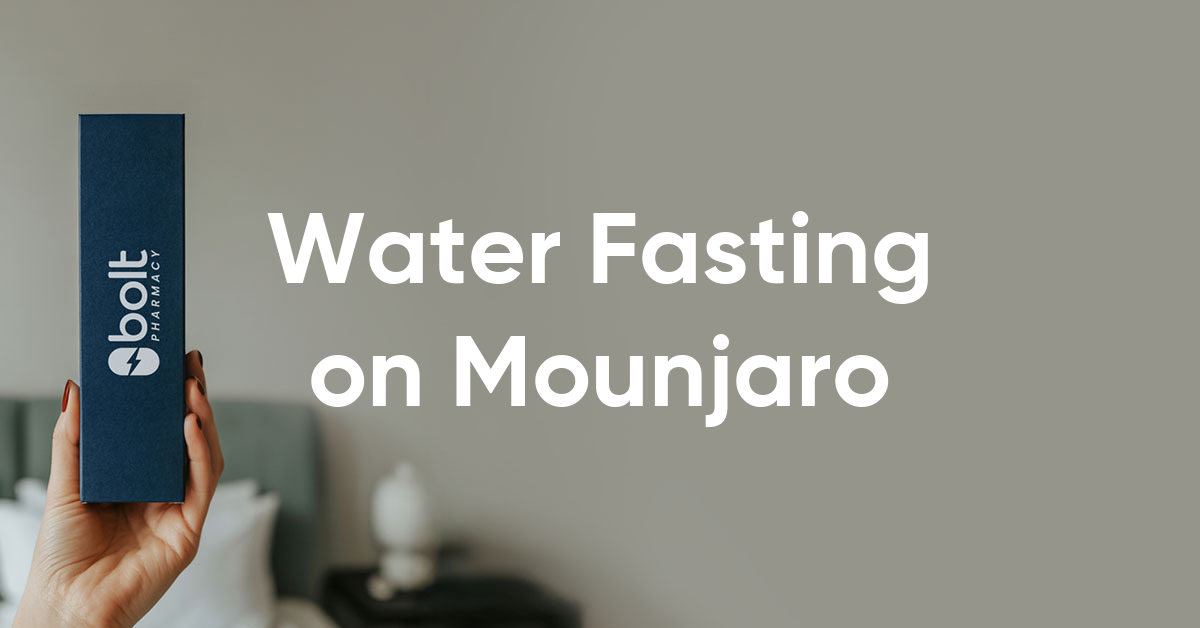Mounjaro (tirzepatide) is a prescription medication licensed in the UK for type 2 diabetes that significantly reduces appetite and food intake. Some patients wonder whether water fasting—abstaining from all food whilst consuming only water—is safe or beneficial whilst taking this medication. Combining water fasting with Mounjaro raises serious medical concerns, including risks of hypoglycaemia, dehydration, nutritional deficiencies, and worsening gastrointestinal side effects. This article examines the mechanisms of Mounjaro, the physiological risks of water fasting, and why this combination is not recommended without explicit medical supervision. Understanding safe dietary approaches whilst taking Mounjaro is essential for effective diabetes management and patient safety.
Summary: Water fasting whilst taking Mounjaro is not recommended without explicit medical supervision due to serious risks including hypoglycaemia, dehydration, nutritional deficiencies, and worsening gastrointestinal side effects.
- Mounjaro (tirzepatide) is a dual GIP/GLP-1 receptor agonist that reduces appetite, slows gastric emptying, and enhances glucose-dependent insulin secretion for type 2 diabetes treatment.
- Water fasting eliminates all food intake, creating compounded caloric restriction when combined with Mounjaro's appetite-suppressing effects, potentially causing excessive weight loss and metabolic disturbances.
- Hypoglycaemia risk increases significantly during water fasting on Mounjaro, particularly if used with insulin or sulfonylureas, requiring intensified blood glucose monitoring under medical guidance.
- Dehydration from Mounjaro's gastrointestinal side effects (nausea, vomiting, diarrhoea) may worsen during water fasting, increasing acute kidney injury risk and electrolyte imbalances.
- Evidence-based dietary approaches include balanced, nutrient-dense eating with lean proteins, non-starchy vegetables, whole grains, and adequate hydration rather than extreme restrictive practices.
- Patients considering any form of modified fasting whilst taking Mounjaro must consult their GP, diabetes specialist nurse, or endocrinologist before making dietary changes.
Table of Contents
What Is Mounjaro and How Does It Work?
Mounjaro (tirzepatide) is a prescription medication licensed in the UK for the treatment of type 2 diabetes mellitus. It belongs to a novel class of medicines known as dual glucose-dependent insulinotropic polypeptide (GIP) and glucagon-like peptide-1 (GLP-1) receptor agonists. This dual mechanism distinguishes Mounjaro from other GLP-1 receptor agonists such as semaglutide.
The medication works through several complementary pathways to improve glycaemic control and promote weight loss. Firstly, it enhances insulin secretion from pancreatic beta cells in a glucose-dependent manner, meaning insulin is released only when blood glucose levels are elevated, thereby reducing the risk of hypoglycaemia. Secondly, Mounjaro suppresses glucagon secretion, which helps prevent the liver from releasing excess glucose into the bloodstream. Thirdly, it slows gastric emptying, leading to prolonged satiety and reduced appetite, which contributes significantly to weight reduction.
Mounjaro is administered as a once-weekly subcutaneous injection, with doses typically starting at 2.5 mg for 4 weeks, then increasing to 5 mg, with further increases in 2.5 mg increments up to a maximum of 15 mg as tolerated. The dose escalation helps minimise gastrointestinal side effects.
Important safety considerations include risks of pancreatitis, gallbladder disease, and acute kidney injury from dehydration. Due to delayed gastric emptying, Mounjaro may reduce the effectiveness of oral contraceptives; non-oral or barrier contraception is recommended for 4 weeks after initiation and after each dose increase. Mounjaro should be avoided during pregnancy and breastfeeding.
Patients prescribed Mounjaro should receive comprehensive counselling about its mechanism, expected benefits, potential adverse effects, and the importance of maintaining a balanced, nutritious diet throughout treatment. Understanding how Mounjaro functions is essential before considering any significant dietary modifications, including restrictive practices such as water fasting.

Understanding Water Fasting: Risks and Considerations
Water fasting involves abstaining from all food and caloric beverages for a defined period, consuming only water. Proponents claim various health benefits, though robust clinical evidence supporting these claims remains limited, particularly in individuals taking prescription medications. Water fasting durations vary considerably, from intermittent protocols (16–24 hours) to extended fasts lasting several days or longer.
From a physiological perspective, water fasting triggers significant metabolic changes. During the initial 24–48 hours, the body depletes glycogen stores and transitions to ketosis, where fat becomes the primary energy source. This metabolic shift can cause symptoms including fatigue, dizziness, headaches, and irritability. Electrolyte imbalances—particularly involving sodium, potassium, and magnesium—represent serious risks during prolonged fasting, potentially leading to cardiac arrhythmias, muscle weakness, and confusion.
Nutritional deficiencies constitute another major concern. Extended water fasting deprives the body of essential vitamins, minerals, proteins, and fatty acids necessary for cellular function, immune response, and tissue repair. Individuals with pre-existing medical conditions face substantially elevated risks, including those with diabetes (particularly type 1), cardiovascular disease, eating disorders, chronic kidney disease, pregnancy, under-18s, and frail older adults. There is no official link established between water fasting and improved long-term health outcomes in clinical populations.
The NHS and British Dietetic Association advise against unsupervised extreme or very low-calorie fasting regimens. For individuals taking medications that affect metabolism, appetite, or blood glucose regulation—such as Mounjaro—the risks associated with water fasting are amplified considerably. Before considering any form of restrictive fasting, patients should understand these potential complications and seek appropriate medical guidance to ensure their safety and wellbeing.
Can You Safely Water Fast While Taking Mounjaro?
Combining water fasting with Mounjaro treatment is not recommended without explicit medical supervision and guidance from your prescribing clinician. There is no official link supporting the safety or efficacy of this combination, and several physiological concerns make this practice potentially hazardous.
Mounjaro already significantly reduces appetite and caloric intake through its mechanism of action. Many patients experience substantial decreases in hunger, early satiety, and reduced food consumption as intended therapeutic effects. Adding water fasting to this already restrictive state creates a compounded caloric deficit that may lead to excessive weight loss, muscle wasting, nutritional deficiencies, and metabolic disturbances. The medication's effect on gastric emptying means patients may feel uncomfortably full even with minimal food intake, and complete food avoidance could exacerbate gastrointestinal symptoms.
Hypoglycaemia risk exists—particularly when combined with severe caloric restriction and especially if Mounjaro is used alongside insulin or sulfonylureas (these medications may need dose adjustment by your clinician if food intake is reduced). Water fasting eliminates the dietary carbohydrates that help maintain stable blood glucose levels, potentially causing dangerous drops in blood sugar. Symptoms of hypoglycaemia include tremor, sweating, confusion, palpitations, and in severe cases, loss of consciousness or seizures.
Additionally, Mounjaro commonly causes gastrointestinal side effects including nausea, vomiting, diarrhoea, and constipation. Water fasting may intensify these symptoms and increase dehydration risk, potentially leading to acute kidney injury, particularly if vomiting or diarrhoea occurs without adequate fluid intake. Rapid weight loss combined with GLP-1/GIP therapy can also increase the risk of gallbladder problems.
Patients should never initiate water fasting whilst taking Mounjaro without first consulting their GP, diabetes specialist nurse, or endocrinologist. Seek urgent medical attention if you experience severe, persistent abdominal pain (with or without vomiting) which could indicate pancreatitis or gallbladder disease, or if you're unable to maintain adequate hydration.
Managing Side Effects and Blood Sugar During Fasting
If, under medical supervision, a patient with diabetes considers any form of modified fasting whilst taking Mounjaro, careful monitoring and management strategies become essential to maintain safety and prevent complications.
Blood glucose monitoring should be intensified during any period of reduced food intake. The frequency and timing of monitoring should be individualised and agreed with your diabetes care team. Generally, blood glucose below 4.0 mmol/L requires immediate intervention with fast-acting carbohydrates (which would necessitate breaking any fast). Seek urgent medical help if your blood glucose remains below 4.0 mmol/L after two treatments, if it falls below 3.0 mmol/L with symptoms, or if you become unconscious. Continuous glucose monitoring systems, if available, provide valuable real-time data and trend information.
Recognising warning signs is crucial. Patients should immediately cease any fasting and seek medical attention if experiencing:
-
Hypoglycaemia (blood glucose <4.0 mmol/L)
-
Significant dizziness, confusion, or altered consciousness
-
Severe nausea, vomiting, or diarrhoea leading to dehydration
-
Chest pain, palpitations, or irregular heartbeat
-
Extreme weakness or inability to perform daily activities
-
Severe, persistent abdominal pain (with or without vomiting)
Hydration and electrolytes require particular attention. Whilst water intake should be maintained, prolonged fasting without electrolyte supplementation can cause dangerous imbalances. Medical supervision may include monitoring of serum electrolytes and appropriate supplementation protocols.
Regarding Mounjaro dosing, patients should continue their once-weekly injection as prescribed. If a dose is missed, and the next scheduled dose is more than 4 days away, take the missed dose as soon as possible. If less than 4 days remain, skip the missed dose and take the next dose on the regularly scheduled day. Never adjust your dosing schedule without explicit instruction from your healthcare provider.
Safe Dietary Approaches While on Mounjaro Treatment
Rather than extreme restrictive practices like water fasting, patients taking Mounjaro should focus on evidence-based nutritional strategies that complement the medication's therapeutic effects whilst maintaining safety and nutritional adequacy.
Balanced, nutrient-dense eating represents the cornerstone of successful Mounjaro treatment. NICE guidance emphasises the importance of a healthy, varied diet alongside pharmacological intervention for both diabetes management and weight loss. Patients should prioritise:
-
Lean proteins (chicken, fish, legumes, tofu) to preserve muscle mass during weight loss
-
Non-starchy vegetables providing essential vitamins, minerals, and fibre
-
Whole grains in appropriate portions for sustained energy and glycaemic control
-
Healthy fats from sources like olive oil, avocados, and nuts in moderation
-
Adequate hydration with water as the primary beverage
Portion control often occurs naturally with Mounjaro due to enhanced satiety signals. Patients should eat slowly, recognising fullness cues, and avoid forcing food consumption when genuinely satisfied. Small, frequent meals may be better tolerated than large portions, particularly during dose titration when gastrointestinal side effects are most common.
Time-restricted eating (such as a 12-hour eating window) may be considered under medical guidance as a less extreme alternative to water fasting, though this should be discussed with your clinical team to ensure adequate nutrition is maintained.
Physical activity is also important, with NICE recommending at least 150 minutes of moderate-intensity activity per week, plus muscle-strengthening activities on two or more days.
Dietitian referral should be requested if patients struggle with meal planning, experience significant side effects affecting food intake, or wish to optimise their dietary approach. Your GP may also be able to refer eligible patients to NHS specialist weight management services. Registered dietitians can provide personalised guidance that accounts for individual preferences, cultural considerations, medical history, and treatment goals.
If you experience any suspected side effects from Mounjaro, report them via the MHRA Yellow Card scheme (yellowcard.mhra.gov.uk or the Yellow Card app).
Scientific References
- Mounjaro KwikPen 10mg solution for injection in pre-filled pen - Summary of Product Characteristics (SmPC).
- Mounjaro - European Public Assessment Report (EPAR).
- Overweight and obesity management (NG246).
- Obesity - Treatment.
- Intermittent fasting diets for type 2 diabetes remission.
- Tirzepatide Once Weekly for the Treatment of Obesity.
Frequently Asked Questions
Can I do water fasting whilst taking Mounjaro?
Water fasting whilst taking Mounjaro is not recommended without explicit medical supervision. The combination creates serious risks including hypoglycaemia, dehydration, nutritional deficiencies, and worsening gastrointestinal side effects, as Mounjaro already significantly reduces appetite and food intake.
What are the main risks of combining water fasting with Mounjaro?
The main risks include dangerous drops in blood glucose (hypoglycaemia), severe dehydration and electrolyte imbalances, acute kidney injury, excessive weight loss with muscle wasting, nutritional deficiencies, and intensified gastrointestinal side effects such as nausea and vomiting.
What dietary approach is recommended whilst taking Mounjaro?
A balanced, nutrient-dense diet is recommended, prioritising lean proteins, non-starchy vegetables, whole grains in appropriate portions, and healthy fats. Patients should focus on portion control guided by natural satiety signals rather than extreme restrictive practices, with referral to a registered dietitian if needed for personalised guidance.
The health-related content published on this site is based on credible scientific sources and is periodically reviewed to ensure accuracy and relevance. Although we aim to reflect the most current medical knowledge, the material is meant for general education and awareness only.
The information on this site is not a substitute for professional medical advice. For any health concerns, please speak with a qualified medical professional. By using this information, you acknowledge responsibility for any decisions made and understand we are not liable for any consequences that may result.
Heading 1
Heading 2
Heading 3
Heading 4
Heading 5
Heading 6
Lorem ipsum dolor sit amet, consectetur adipiscing elit, sed do eiusmod tempor incididunt ut labore et dolore magna aliqua. Ut enim ad minim veniam, quis nostrud exercitation ullamco laboris nisi ut aliquip ex ea commodo consequat. Duis aute irure dolor in reprehenderit in voluptate velit esse cillum dolore eu fugiat nulla pariatur.
Block quote
Ordered list
- Item 1
- Item 2
- Item 3
Unordered list
- Item A
- Item B
- Item C
Bold text
Emphasis
Superscript
Subscript












